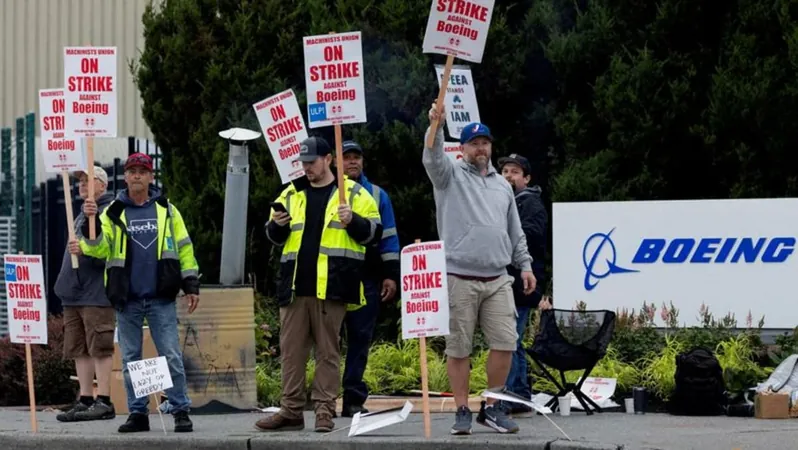
Boeing Workers Face Critical Vote on New Wage Deal – Could This End the Ongoing Strike?
2024-11-04
Author: Jia
SEATTLE: Boeing factory workers on the US West Coast are gearing up for an important vote on an enhanced contract offer set for Monday, November 4. This decision could potentially bring a resolution to a seven-week labor strike that has significantly disrupted jet production at the aerospace giant.
Boeing is now presenting its fourth contract offer since the strike began on September 13. This proposal includes a notable wage increase of 38 percent over four years, a slight uptick from the previous 35 percent raise which was overwhelmingly rejected by approximately two-thirds of the 33,000 striking machinists just 12 days ago.
The timing of this offer is particularly crucial for Boeing, which recently revealed plans for a staggering $24 billion share issuance to stabilize its finances. The ongoing strike has stalled production of the highly profitable 737 MAX jet, a key component of Boeing’s earnings.
Analysts from Jefferies have calculated that the proposed wage hike could add around $1.1 billion to the workers' existing cost base of roughly $2.5 billion over the lifetime of the contract. The ongoing negotiations have created an atmosphere of uncertainty amongst the workforce, which has divided opinions on the acceptability of the new terms.
Jon Holden, President of the International Association of Machinists and Aerospace Workers (IAM) District 751, has publicly endorsed the latest contract proposal, cautioning that a rejection could lead to less favorable terms in any future offers from Boeing.
Boeing's stock prices experienced a rise last Friday, with investors betting that workers might accept the deal, signaling a recovery for the company beset by crises. Voting on the contract will kick off at 7am US Pacific Time and will conclude at 7pm, with results expected in a matter of hours.
While some factory workers express a willingness to return to work, others are holding out for better benefits and have voiced their aspirations for a 40 percent wage increase. The outcome of this vote holds potential implications not only for the future of Boeing but for various aerospace suppliers who have had to furlough workers due to the production stoppage, as well as airlines facing delays in aircraft deliveries.
The discourse among workers reflects a broader discontent toward wage stagnation over the last decade. Many argue that the proposed raises still do not compensate for years of inadequate pay adjustments and the loss of defined-benefit pensions. Union members report only receiving an average of just four percent wage increases over the past eight years.
“I have to pick up a side hustle to make ends meet,” explained Jeffrey Dodge, a machinist involved in making 737 wings, who also runs a small business selling mushroom extracts. Although Dodge plans to vote against the new deal, he notes that many colleagues in the Renton area are taking secondary jobs just to cover their basic living expenses.
Despite concerns, Boeing claims that the average annual earnings for machinists would rise to $119,309 by the end of the proposed contract, up from the $75,608 average of the previous deal. This increase is tempting some workers who feel the economic pressure building in their lives.
“I’ll probably vote 'yes,'” shared Ian Hill, a 29-year-old worker living in a tough neighborhood. “I need to approve it, and maybe in four years, we can negotiate for better terms.”
As the clock ticks down to the vote, the stakes have never been higher for the Boeing workforce, and the future of the company hangs in the balance. Will they accept this deal, or will they push for more? Only time will tell if Boeing can effectively turn the tide.



 Brasil (PT)
Brasil (PT)
 Canada (EN)
Canada (EN)
 Chile (ES)
Chile (ES)
 España (ES)
España (ES)
 France (FR)
France (FR)
 Hong Kong (EN)
Hong Kong (EN)
 Italia (IT)
Italia (IT)
 日本 (JA)
日本 (JA)
 Magyarország (HU)
Magyarország (HU)
 Norge (NO)
Norge (NO)
 Polska (PL)
Polska (PL)
 Schweiz (DE)
Schweiz (DE)
 Singapore (EN)
Singapore (EN)
 Sverige (SV)
Sverige (SV)
 Suomi (FI)
Suomi (FI)
 Türkiye (TR)
Türkiye (TR)